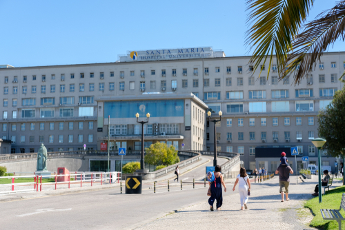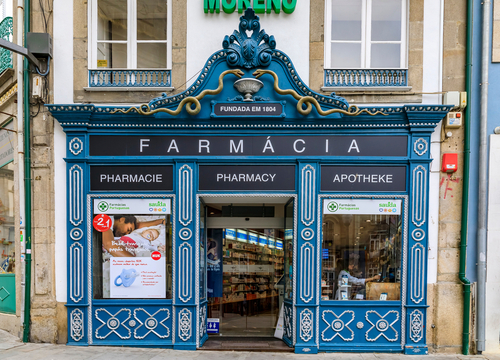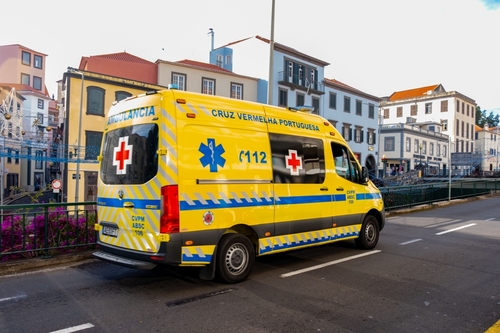Healthcare In Portugal:
Complete Guide For Expats In 2025

Portugal boasts one of the best healthcare systems in Europe.
Portugal has gained worldwide recognition for its high-quality healthcare system, which provides affordable and accessible medical care to residents and expatriates alike. Whether you’re planning to retire, work, or live in Portugal, understanding how the healthcare system operates will help you make informed decisions about your medical needs.
The country offers a universal healthcare system, known as the Serviço Nacional de Saúde (SNS), which provides public healthcare services at low costs. In addition to the public system, Portugal has a well-developed private healthcare sector that offers faster access to specialists and shorter wait times for treatments. Many expats choose a combination of public and private healthcare to ensure comprehensive coverage.
This guide will explore everything you need to know about Portugal’s healthcare system, including costs, insurance options, quality of care, and how it compares to other countries. Whether you need routine medical services or specialized treatments, Portugal’s healthcare system ensures that you receive high-quality care at a reasonable price.
- Healthcare In Portugal: Complete Guide For Expats In 2025
- How the Healthcare System in Portugal Works
- Public vs. Private Healthcare in Portugal
- Healthcare Costs in Portugal
- Health Insurance in Portugal
- Quality of Healthcare in Portugal
- Medical Tourism in Portugal
- Availability of Medications in Portugal
- Emergency Medical Care in Portugal
- Sign up to Overseas Dream Home now, and Discover The Best Places in the World to Buy Real Estate 2025.
- Sign up to Overseas Dream Home now, and Discover The Best Places in the World to Buy Real Estate 2025.

Reviewed by Ronan McMahon
Ronan McMahon is an Amazon best-selling author and expert in international real estate. He regularly contributes to Overseas Dream Home. Visit his website at ronanmcmahon.com
How the Healthcare System
in Portugal Works

As well as offering a laidback lifestyle in a charming location, Portugal has a high-quality healthcare system.
Portugal’s healthcare system is divided into public healthcare (SNS) and private healthcare, both of which provide high-quality medical services.
The Serviço Nacional de Saúde (SNS) is Portugal’s publicly funded healthcare system, offering low-cost medical care to residents, including Portuguese citizens, legal foreign residents, and European Union (EU) nationals with an EHIC (European Health Insurance Card). The SNS is funded through taxes, allowing patients to access services such as general practitioner (GP) visits, hospital care, maternity services, and emergency treatment for minimal fees.
Public healthcare in Portugal operates on a regional basis, meaning services and wait times can vary depending on the area. While SNS facilities offer excellent care, they can sometimes have longer waiting times for non-urgent procedures due to high demand. Many residents supplement public healthcare with private insurance to access faster appointments and specialized treatments.
The private healthcare sector in Portugal is widely used by both locals and expats who want quicker access to specialists, shorter wait times for elective procedures, and more personalized care. Private hospitals and clinics are well-equipped and often have English-speaking staff, making them a preferred choice for foreigners. Private healthcare is paid for out of pocket or through private health insurance, which is relatively affordable compared to other Western countries.
Expats moving to Portugal should register with the SNS to access public healthcare services and consider private insurance for additional coverage. With a strong mix of public and private options, Portugal’s healthcare system ensures that residents receive high-quality and affordable medical care, regardless of their needs.
Public vs. Private Healthcare in Portugal

With 300 days of sunshine annually, Portugal’s Algarve offers a healthy lifestyle that’s complemented by its healthcare system.
Portugal offers both public and private healthcare options, each with its own advantages. The public healthcare system (SNS) is tax-funded and provides affordable medical services to residents, including general practitioner visits, hospital treatments, maternity care, and emergency services. While costs are low (many consultations range from $6 to $23) for non-urgent procedures and specialist appointments can have long wait times due to demand.
In contrast, private healthcare offers shorter wait times, quicker access to specialists, and a higher level of personalized care. Many private hospitals and clinics feature modern facilities and English-speaking staff, making them a preferred option for expats. Private healthcare costs are significantly higher than public services, but private health insurance can help offset expenses. Many residents choose a combination of both systems, using SNS for routine care while relying on private providers for faster specialist access and elective procedures.
While both systems provide high-quality care, the choice between public and private healthcare depends on individual needs. Those who prioritize affordability and don’t mind longer wait times often use SNS, while those seeking faster service and premium care prefer private healthcare. Regardless of the choice, Portugal ensures accessible and well-regarded medical care for all residents.
Healthcare Costs in Portugal

Portugal for its affordable cost of living…including healthcare costs.
Portugal is known for its affordable healthcare system, offering high-quality medical services at a fraction of the cost compared to countries like the U.S. While public healthcare is not entirely free, it is heavily subsidized, making medical expenses manageable for residents.
Under the Serviço Nacional de Saúde (SNS), most medical services require a small co-payment. A general practitioner (GP) visit typically costs between €5 and €20, while a specialist consultation may cost a little bit more. Hospital stays in public facilities are also low-cost, often $25 per day, though emergency services and urgent care visits are usually free for Portuguese citizens and legal residents. Certain groups, such as children, pregnant women, and low-income individuals, are exempt from these charges.
For those opting for private healthcare, costs can be significantly higher. A private GP consultation may cost $55 to $120, while specialist visits can range from $90 to $175. Private hospital stays, surgeries, and advanced treatments are also more expensive but remain relatively affordable compared to other Western countries. Many expats and higher-income residents choose private health insurance, which costs between $35 and $120 per month, depending on coverage. This helps reduce out-of-pocket expenses and ensures faster access to specialists and treatments.
Pharmaceutical costs in Portugal are also lower than in many countries, with medications subsidized by the government. Prescription drugs often come with discounts of up to 90% under SNS, making essential medications highly affordable. Private pharmacies are widely available, and many common medications can be purchased over the counter without a prescription.
Overall, healthcare in Portugal is both high-quality and cost-effective. Whether using public or private services, residents benefit from a well-structured system that prioritizes accessibility and affordability.
Health Insurance in Portugal

For peace of mind, many expats living in Portugal opt for private health insurance, which is also affordable here.
While Portugal’s public healthcare system provides affordable medical care, many residents and expats choose to supplement it with private health insurance for faster access to specialists, reduced wait times, and more personalized care. Health insurance in Portugal is relatively inexpensive compared to other Western countries, making private coverage an attractive option.
For residents using the public healthcare system (SNS), private insurance is not mandatory. However, those who prefer private hospitals and clinics often take out private health insurance, which can cover outpatient visits, surgeries, diagnostic tests, and dental care. Insurance plans range from $35 to $120 per month, depending on the level of coverage, age, and pre-existing conditions. Some international insurers also offer plans tailored to expats, allowing flexibility in accessing healthcare both in Portugal and abroad.
Portugal has several well-established local insurance providers, including Médis, Multicare, Allianz Portugal, and Fidelidade, which offer competitive plans with extensive private hospital networks. Many international companies, such as Cigna, Bupa, and AXA, also provide coverage in Portugal, making them a good choice for expats who want global healthcare access.
EU nationals can use the European Health Insurance Card (EHIC) for short-term medical needs in Portugal, but long-term residents should consider local insurance options. Employers in Portugal often provide private health insurance as part of their benefits package, covering employees and sometimes their families.
While private insurance is not a necessity for all residents, it significantly enhances healthcare access, particularly for those who prefer private facilities or need specialized care. Whether relying on the SNS, private insurance, or a mix of both, Portugal offers a range of options to ensure comprehensive and affordable healthcare coverage.

Sign up to Overseas Dream Home now, and Discover The Best Places in the World to Buy Real Estate 2025.
Enter your email now to download The Best Places in the World to Buy Real Estate in 2025.
You’ll also start receiving your free Overseas Dream Home eletter in your inbox every day!
No-spam pledge: We value your privacy. You can unsubscribe at any time.
Quality of Healthcare in Portugal

Portugal’s larger towns of cities have high-quality medical facilities.
Portugal’s healthcare system is ranked among the best in Europe, offering high-quality medical services, well-trained professionals, and modern facilities. Both public and private healthcare providers adhere to strict medical standards, ensuring that residents and expats receive excellent care.
Public hospitals and clinics under the Serviço Nacional de Saúde (SNS) provide comprehensive medical services, including general practice, specialist care, and emergency treatment. While public healthcare is affordable and widely accessible, some facilities, particularly in rural areas, may have longer wait times and fewer resources compared to urban centers like Lisbon and Porto. In major cities, public hospitals are well-equipped and staffed with highly skilled doctors, many of whom have trained abroad.
The private healthcare sector in Portugal is known for its world-class facilities, shorter waiting times, and high patient satisfaction. Private hospitals and clinics offer faster access to specialists, advanced treatments, and English-speaking staff, making them particularly appealing to expats. Many of Portugal’s private hospitals, such as Hospital da Luz, CUF Hospitals, and Lusíadas Saúde, are internationally accredited and provide services on par with leading medical institutions in Europe and North America.

One of Portugal’s largest hospitals, located in the capital, Lisbon.
Portugal’s healthcare system also follows strict regulatory oversight, ensuring high medical standards. The Portuguese Medical Association (Ordem dos Médicos) oversees doctors’ qualifications and ethics, while the Entidade Reguladora da Saúde (ERS) monitors healthcare providers, ensuring compliance with quality and safety standards.
Overall, Portugal offers excellent healthcare, with well-trained professionals and a strong balance between public and private services. While wait times in the public system can be an issue for non-urgent procedures, the availability of high-quality private care ensures that residents have access to world-class medical treatment when needed.
Medical Tourism in Portugal

It’s not just Portugal’s natural beauty that attracts visitors, the country is also popular with medical tourists.
Portugal is a leading destination for high-quality and affordable medical treatments, attracting both residents and medical tourists. The country’s healthcare system offers a wide range of specialized procedures, from routine check-ups to advanced surgeries, often at lower costs than in the U.S. and other Western nations.
One of the most sought-after services in Portugal is dental care. The country is known for its highly skilled dentists and modern clinics, offering procedures such as implants, crowns, and cosmetic dentistry at significantly lower prices than in North America or Northern Europe. Many expats and visitors travel to Portugal specifically for dental treatments, as private dental care is widely available and reasonably priced.
Cosmetic surgery is another popular option, with many private clinics providing procedures such as facelifts, liposuction, and breast augmentation. Portugal has strict medical regulations, ensuring that cosmetic procedures meet high safety and quality standards.
The country is also recognized for its expertise in orthopedic procedures, including knee and hip replacements. Private hospitals provide state-of-the-art facilities and internationally trained surgeons, making Portugal a preferred choice for those seeking high-quality joint and bone treatments.
Additionally, Portugal is known for its advanced fertility treatments, with some of the best in vitro fertilization (IVF) clinics in Europe. The country has progressive reproductive health laws, and private fertility clinics offer high success rates at lower costs compared to other Western countries.
Other commonly sought-after treatments include cardiology services, eye surgeries (such as LASIK), and weight-loss procedures like gastric bypass surgery. Many private hospitals in Portugal cater to international patients, offering multilingual staff and streamlined services for those traveling for medical care.
Availability of Medications in Portugal

Many expats find that their medications are more freely available in Portugal than at home.
Portugal has a well-regulated and easily accessible pharmaceutical system, ensuring that residents and expats can obtain most medications without difficulty. Pharmacies (farmácias) are widely available in cities, towns, and even rural areas, providing both prescription and over-the-counter drugs at affordable prices.
Many common medications, including antibiotics, pain relievers, and treatments for chronic conditions like diabetes or high blood pressure, are available in Portugal. Some medications that require a prescription in other countries can be purchased over the counter here, making it easier for residents to access necessary treatments without multiple doctor visits. However, stronger medications, such as controlled substances or specialized treatments, require a valid prescription from a doctor.
Portugal’s Serviço Nacional de Saúde (SNS) subsidizes many prescription medications, significantly reducing costs for residents. Depending on the medication, the government may cover up to 90% of the price, making essential treatments highly affordable. Those using private healthcare can still purchase medications at regular market prices, which are often lower than in the U.S. and other Western nations.
Most pharmacies in Portugal operate with extended hours, and 24-hour pharmacies (farmácias de serviço) are available in major cities for urgent medical needs. Pharmacists in Portugal are highly trained and can provide medical advice, recommend alternatives, and assist with minor health concerns.
For expats and visitors, it’s a good idea to check if specific medications from your home country are available under the same name or formula, as some drugs may have different brand names in Portugal. If a particular medication isn’t available, pharmacists can often provide an equivalent alternative.
Portugal’s pharmaceutical system ensures that residents and expats have convenient, affordable, and reliable access to medications, supporting a high standard of healthcare across the country.
Emergency Medical Care in Portugal

Like its health system, Portugal’s emergency care is readily available and low cost.
Portugal has a well-developed emergency healthcare system that ensures residents and visitors receive prompt medical attention in urgent situations. The country operates both public and private emergency care facilities, with a high standard of treatment available across hospitals, urgent care centers, and ambulance services.
In the event of a medical emergency, the national emergency number 112 can be dialed for immediate assistance. This number connects callers to ambulance services, fire departments, and police, and is free to use. Public hospitals under the Serviço Nacional de Saúde (SNS) provide emergency treatment at little to no cost for residents, while private hospitals offer faster service but require payment or private insurance coverage.
Emergency departments in public hospitals operate on a triage system, where patients are prioritized based on the severity of their condition. Life-threatening cases are treated immediately, while less urgent conditions may involve longer wait times. In major cities like Lisbon, Porto, and Faro, public hospitals are well-equipped to handle emergencies, but in rural areas, smaller facilities may transfer patients to larger hospitals if specialized care is needed.
Private hospitals and clinics offer an alternative for those seeking shorter wait times and personalized care. These facilities provide immediate attention for emergencies, but treatment must be paid for out of pocket unless covered by private health insurance. Many expats and travelers choose to visit private hospitals for urgent care due to the efficiency and availability of English-speaking medical staff.
Portugal also has urgent care centers (Urgências Básicas) for non-life-threatening medical needs, such as minor injuries, infections, or sudden illnesses. These centers are a good option for those needing immediate care without the long wait times of a hospital emergency room.
Pharmacies play an important role in emergency care as well. Many farmácias de serviço (24-hour pharmacies) operate on a rotating schedule, ensuring access to medications at any time of day. Pharmacists can also provide basic medical advice and direct patients to appropriate medical facilities when necessary.
Overall, Portugal’s emergency healthcare system is highly reliable, ensuring that both residents and visitors receive timely and effective medical treatment when needed.ment, owning real estate here provides both personal and financial benefits.

Sign up to Overseas Dream Home now, and Discover The Best Places in the World to Buy Real Estate 2025.
Enter your email now to download The Best Places in the World to Buy Real Estate in 2025.
You’ll also start receiving your free Overseas Dream Home eletter in your inbox every day!
No-spam pledge: We value your privacy. You can unsubscribe at any time.